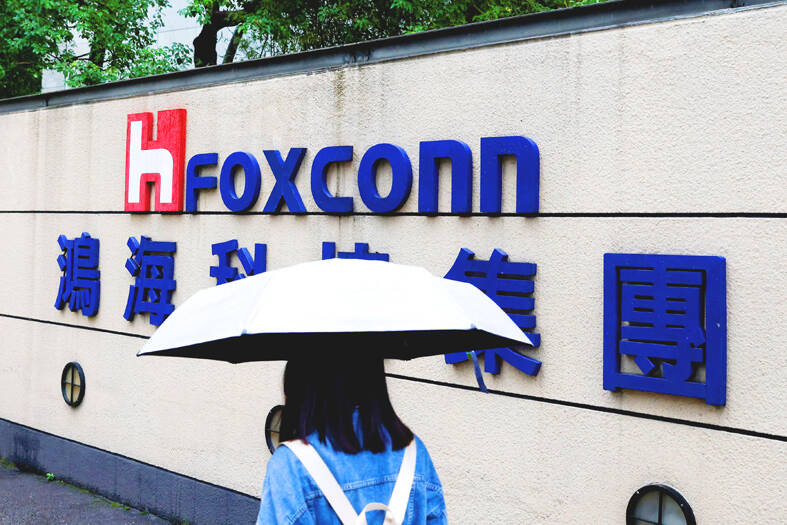Apple Inc partner Foxconn Technology Group (富士康科技集團) plans to invest about US$700 million on a new plant in India to ramp up local production, people familiar with the matter said, underscoring an accelerating shift of manufacturing away from China as Washington-Beijing tensions grow.
The company, known as Hon Hai Precision Industry Co (鴻海精密) in Taiwan, plans to build the plant to make iPhone parts on a 121 hectare site close to the airport in Bengaluru, the capital of the southern Indian state of Karnataka, said the people, who asked not to be named as the information is not public.
The factory might assemble Apple’s handsets, some of the people said, and Foxconn might also use the site to produce some parts for its nascent electric vehicle business.

Photo: Carlos Garcia Rawlins, Reuters
The investment is one of Foxconn’s biggest single outlays to date in India and underscores how China is at risk of losing its status as the world’s largest producer of consumer electronics.
Apple and other US brands are leaning on their China-based suppliers to explore alternative locations such as India and Vietnam. It is a rethink of the global supply chain that accelerated during the COVID-19 pandemic and the war in Ukraine, and could reshape the way global electronics are made.
The new production site in India is expected to create about 100,000 jobs, the people said.
The company’s iPhone assembly complex in Zhengzhou, China, employs about 200,000 people at the moment, although that number surges during peak production season.
Output at the plant in Henan Province plunged ahead of the year-end holidays due to pandemic-related disruptions, spurring Apple to re-examine its China-reliant supply chain.
Foxconn’s decision is the latest move that suggests suppliers might move capacity out of China far faster than expected.
The plans could still change, as Foxconn is in the process of finalizing investment and project details, the people said.
It was also unclear whether the plant represents new capacity or production that Foxconn is shifting from other sites such as its Chinese facilities.
Apple declined to comment.
Hon Hai, whose chairman, Young Liu (劉揚偉), met with Indian Prime Minister Narendra Modi this week, did not immediately respond to an e-mail seeking comment.
The Karnataka state government also did not immediately respond.
Liu, who is on tour in India, has committed to another manufacturing project in Telangana state.
Foxconn’s decision would be a coup for Modi’s government, which sees an opportunity to close India’s technology gap with China as Western investors and corporations sour on Beijing’s crackdowns on the private sector.
India has offered financial incentives to Apple suppliers such as Foxconn, which began making the latest generation of iPhones at a site in Tamil Nadu last year.
Smaller rivals Wistron Corp (緯創) and Pegatron Corp (和碩) have also ramped up operations in India, while suppliers such as Jabil Inc have begun making components for AirPods there.

The Eurovision Song Contest has seen a surge in punter interest at the bookmakers, becoming a major betting event, experts said ahead of last night’s giant glamfest in Basel. “Eurovision has quietly become one of the biggest betting events of the year,” said Tomi Huttunen, senior manager of the Online Computer Finland (OCS) betting and casino platform. Betting sites have long been used to gauge which way voters might be leaning ahead of the world’s biggest televised live music event. However, bookmakers highlight a huge increase in engagement in recent years — and this year in particular. “We’ve already passed 2023’s total activity and

BIG BUCKS: Chairman Wei is expected to receive NT$34.12 million on a proposed NT$5 cash dividend plan, while the National Development Fund would get NT$8.27 billion Taiwan Semiconductor Manufacturing Co (TSMC, 台積電), the world’s largest contract chipmaker, yesterday announced that its board of directors approved US$15.25 billion in capital appropriations for long-term expansion to meet growing demand. The funds are to be used for installing advanced technology and packaging capacity, expanding mature and specialty technology, and constructing fabs with facility systems, TSMC said in a statement. The board also approved a proposal to distribute a NT$5 cash dividend per share, based on first-quarter earnings per share of NT$13.94, it said. That surpasses the NT$4.50 dividend for the fourth quarter of last year. TSMC has said that while it is eager

‘IMMENSE SWAY’: The top 50 companies, based on market cap, shape everything from technology to consumer trends, advisory firm Visual Capitalist said Taiwan Semiconductor Manufacturing Co (TSMC, 台積電) was ranked the 10th-most valuable company globally this year, market information advisory firm Visual Capitalist said. TSMC sat on a market cap of about US$915 billion as of Monday last week, making it the 10th-most valuable company in the world and No. 1 in Asia, the publisher said in its “50 Most Valuable Companies in the World” list. Visual Capitalist described TSMC as the world’s largest dedicated semiconductor foundry operator that rolls out chips for major tech names such as US consumer electronics brand Apple Inc, and artificial intelligence (AI) chip designers Nvidia Corp and Advanced

Pegatron Corp (和碩), an iPhone assembler for Apple Inc, is to spend NT$5.64 billion (US$186.82 million) to acquire HTC Corp’s (宏達電) factories in Taoyuan and invest NT$578.57 million in its India subsidiary to expand manufacturing capacity, after its board approved the plans on Wednesday. The Taoyuan factories would expand production of consumer electronics, and communication and computing devices, while the India investment would boost production of communications devices and possibly automotive electronics later, a Pegatron official told the Taipei Times by telephone yesterday. Pegatron expects to complete the Taoyuan factory transaction in the third quarter, said the official, who declined to be